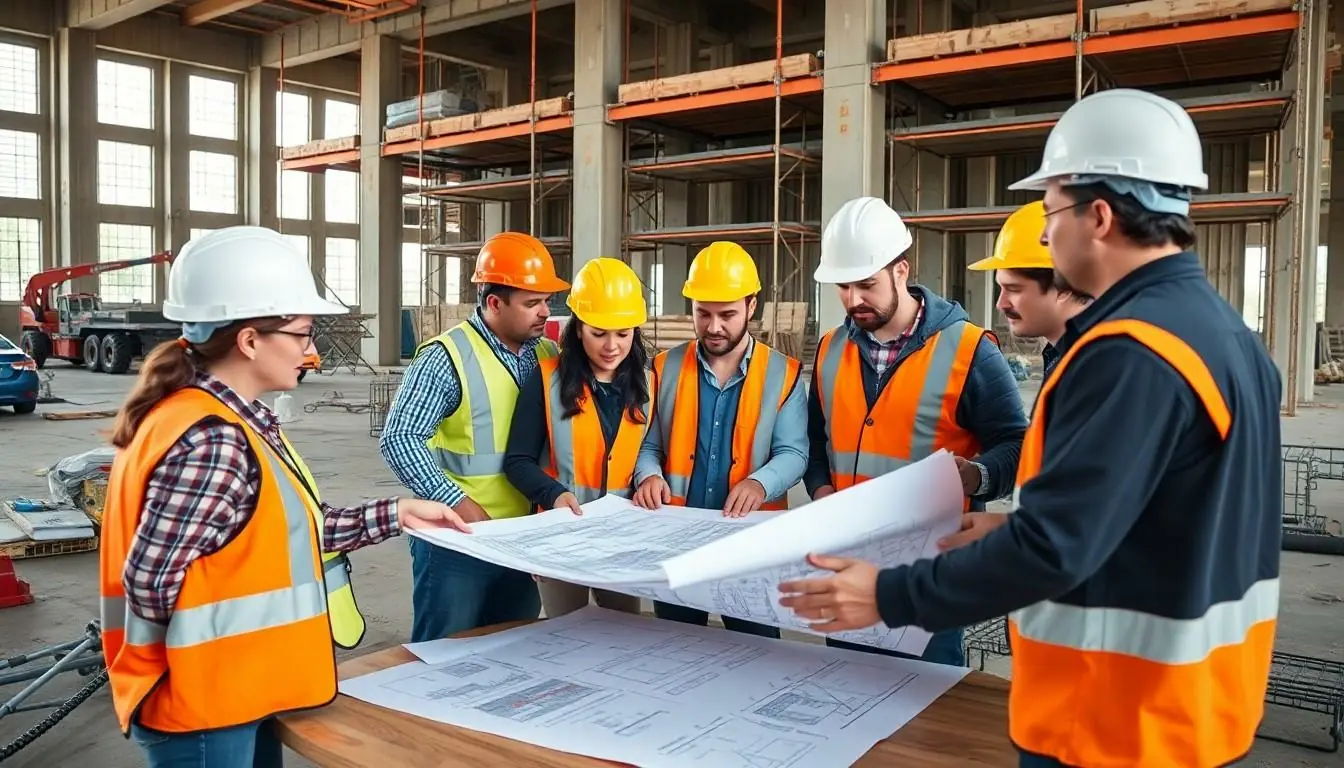In the world of building construction management, chaos can reign supreme if not handled with finesse. Imagine a site where deadlines are as slippery as wet cement and budgets are tighter than a pair of skinny jeans after Thanksgiving. Yet, with the right management strategies in place, this chaos can transform into a symphony of efficiency and success.
Building construction management isn’t just about hammering nails and pouring concrete; it’s about orchestrating a complex dance of resources, timelines, and people. A skilled manager knows how to juggle these elements while keeping the project on track and the team motivated. So, whether you’re a seasoned pro or just stepping onto the construction site, understanding the nuances of effective management can make all the difference between a project that’s a masterpiece and one that ends up as a cautionary tale.
Table of Contents
ToggleOverview of Building Construction Management
Building construction management involves overseeing the entire construction process from start to finish. This discipline encompasses many responsibilities, including planning, coordination, and execution of all project tasks. Effective management integrates various elements such as finances, scheduling, and personnel management to achieve project goals.
Project managers coordinate resources like materials and labor while ensuring compliance with safety regulations. Efficiency plays a crucial role, as project delays and cost overruns commonly result from poor planning. It is essential to implement robust strategies for risk management, addressing potential issues before they escalate.
Collaboration is fundamental in building construction management. Close communication among stakeholders, including architects, engineers, and contractors, enhances project outcomes. Regular meetings and updates help in identifying challenges early, allowing teams to adapt as necessary.
Construction management also necessitates an understanding of technology advancements. Software tools streamline processes, facilitating better project tracking and data analysis. Using these tools can lead to improved decision-making and increased overall efficiency.
Budget management remains a top priority throughout the project lifecycle. Monitoring expenditures and forecasting future costs ensure projects remain financially viable. Regular financial assessments and adjustments assist in staying within budget parameters.
Overall, building construction management requires a blend of technical skills and interpersonal abilities. Success hinges on the management team’s capacity to foster collaboration, optimize resources, and navigate the complexities of the construction environment effectively.
Key Phases in Building Construction Management

Building construction management involves several critical phases that ensure project success. Each phase contributes to the overall efficiency and effectiveness of the construction process.
Planning and Design
Planning and design set the foundation for any construction project. Initial assessments define project scope, budget, and timeline. Stakeholders collaborate to create architectural plans and specifications. Architects, engineers, and clients engage in discussions to finalize designs. Compliance with local regulations ensures all aspects align with legal standards. Using advanced software enhances design accuracy and aids in visualizing the project. Documentation reflects this collaboration, establishing clear guidelines for execution.
Execution and Monitoring
Execution and monitoring serve as vital phases in the construction process. Project managers coordinate resources, scheduling, and personnel during implementation. Regular site inspections help assess progress against established plans. Real-time reporting tools allow easy tracking of timelines and budgets. Collaboration continues among stakeholders to address issues swiftly. Effective communication mitigates potential delays and conflicts. Safety protocols remain a priority, ensuring compliance with regulations throughout construction.
Project Closeout
Project closeout finalizes the construction process, affirming project completion. This phase includes comprehensive inspections to ensure standards meet quality expectations. Punch lists itemize any remaining tasks or corrections needed. Client walkthroughs confirm project satisfaction and address final requests. Documentation archives project details, promoting transparency for future reference. Financial reviews analyze budget adherence and cost management. Successful project closeout fosters positive relationships with all involved parties, paving the way for future collaborations.
Essential Skills for Building Construction Managers
Building construction managers require specific skills to navigate the complexities of their roles successfully. Mastering these skills enables them to lead teams effectively and manage projects efficiently.
Leadership and Communication
Effective leadership helps build a cohesive team environment. Construction managers must articulate project goals clearly to ensure everyone is aligned. They facilitate regular meetings to foster open dialogue and encourage feedback from team members. Conflict resolution skills come into play when addressing disagreements or misunderstandings. Strong communication also extends to stakeholders, ensuring that clients, architects, and contractors remain informed throughout the project. Adaptability in communication styles is crucial, allowing managers to connect with diverse teams and individuals within construction environments.
Time and Resource Management
Time management remains a cornerstone of building construction management. Managers often create detailed schedules that outline project milestones, helping teams stay on track. Resource allocation involves assessing material availability and labor needs to prevent delays. Prioritizing tasks based on urgency and importance optimizes workflow and boosts productivity. Utilizing software tools enhances tracking capabilities, allowing for real-time updates on project statuses. Budget constraints necessitate constant monitoring of expenses to ensure financial adherence, promoting overall project efficiency. Balancing these elements is vital in delivering successful projects on time and within budget.
Challenges in Building Construction Management
Building construction management faces several challenges that can impact project outcomes. Two critical areas often present obstacles are budget constraints and regulatory compliance.
Budget Constraints
Budget constraints significantly influence the decision-making process within construction projects. Limited funds require project managers to prioritize essential tasks while seeking cost-effective methods to meet project goals. Financial oversight becomes crucial, as unforeseen expenses can lead to delays and compromises in quality. Project managers regularly analyze expenses and adjust budgets to avoid overruns. Allocating funds effectively for labor, materials, and contingencies ensures all aspects of construction remain on track. Staying within budget contributes to overall project viability and success.
Regulatory Compliance
Regulatory compliance represents another major challenge in building construction management. Construction projects must adhere to numerous local, state, and federal regulations regarding safety, environmental impact, and zoning. Understanding these regulations is essential to avoid costly penalties or delays. Often, working with legal experts and regulatory bodies ensures compliance throughout the construction lifecycle. Enforcing safety measures and maintaining proper documentation are vital to passing inspections. Staying informed about updates in building codes and regulations allows project managers to navigate complexities and foster a compliant construction environment.
Future Trends in Building Construction Management
Emerging trends in building construction management highlight significant advancements in technology and sustainability. These developments reshape the industry landscape, improving efficiency and environmental impact.
Technology Integration
Adopting technology streamlines processes in construction projects. Building information modeling (BIM) plays a crucial role in providing detailed 3D models, improving visualization and coordination among stakeholders. Drones enhance site inspections, offering real-time data on progress and identifying potential delays. Cloud-based project management tools facilitate communication, enabling teams to collaborate effectively regardless of their location. Machine learning algorithms analyze project data, predicting outcomes and optimizing scheduling. The integration of virtual and augmented reality improves training and stakeholder engagement, allowing for immersive experiences in design reviews.
Sustainable Practices
Implementing sustainable practices becomes essential in modern construction management. Green building certifications promote energy efficiency and reduce the environmental footprint of structures. Utilizing renewable materials contributes to sustainability, while energy-efficient systems significantly lower operational costs. Waste management strategies focus on minimizing waste during construction, encouraging recycling and reusing materials. Additionally, incorporating smart technology enables real-time monitoring of energy consumption, further enhancing operational efficiency. Prioritizing sustainable practices not only meets regulatory requirements but also fosters positive perceptions among clients and communities.
Building construction management is a multifaceted discipline that requires a blend of technical expertise and strong interpersonal skills. As the industry evolves with new technologies and sustainability practices, staying ahead of trends becomes crucial for success. Effective project managers must prioritize communication and collaboration among stakeholders to navigate challenges and ensure project goals are met.
By mastering the intricacies of resource allocation, budget management, and regulatory compliance, they can transform potential chaos into streamlined operations. The future of building construction management lies in the ability to adapt and innovate while maintaining a focus on efficiency and sustainability. Embracing these principles will not only enhance project outcomes but also contribute to a more responsible construction industry.



